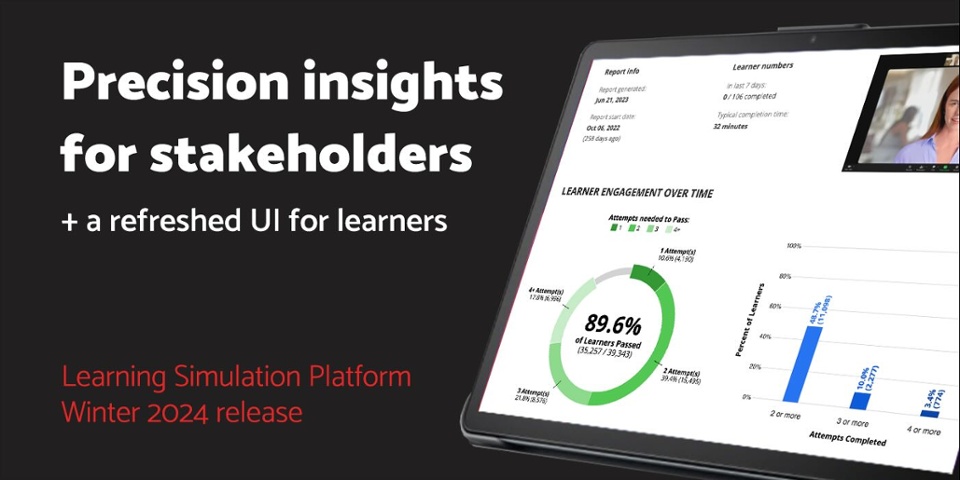Adaptive learning for corporate training

Using adaptive learning for corporate training can be a great source of competitive advantage for many companies. L&D leaders are well aware that personalized learning experiences improve knowledge retention and skills development due to higher levels of role-relevance and learner engagement.
However, a concern is often how to deliver this at scale - especially when training a large, geographically dispersed - even global - workforce. Despite this concern, it is possible to take advantage of the many benefits of adaptive learning for hundreds or even thousands of employees at the same time. The latest technology in skill-based assessment is being leveraged by some of the world’s leading brands to transform their approach to adaptive learning.
What is adaptive learning?
Adaptive learning is a pedagogical strategy that customizes the training experience according to each learner's unique requirements. This is achieved through the collection of data related to the learner's progress, inclinations, and learning style, enabling presentation of the most pertinent and appealing content.
Adaptive learning based on research
In the video below, Dr Declan Dagger discusses the behavioral science research behind immersive simulations created by ETU.
Declan’s research at Trinity College, Dublin was in the area of adaptive learning, and his team then received funding to take that research and apply it within the field of immersive simulation. They set about investigating and validating a set of methods to be able to measure and assess skill development within that immersive experience.
Advantages of adaptive learning
The advantages of adaptive learning are numerous, encompassing:
- Enhanced learner engagement: By offering content that resonates with their interests and learning preferences, adaptive learning can boost learner engagement. By delivering an immersive learning experience, this approach can aid in maintaining learners' motivation and concentration on the training materials.
- Better learning outcomes: Adaptive learning can bolster learning outcomes by offering learners the chance to consume content at their own pace. This approach can facilitate a more comprehensive understanding of the training.
- Training cost reduction: Adaptive learning can contribute to cost reduction by facilitating personalized learning across a vast cohort of learners. This is achievable by utilizing technology such as immersive simulations to measure skill applications and dynamically adapt a learning journey based on skill gaps. These optimized journies typically reduce seat time by 30-50%. .
- Data analytics and accelerated assessment: The conventional approach to education and training requires evaluation at the conclusion of a course, typically through an exam or a practical demonstration. This assessment process generally requires additional time to guarantee precision. However, with adaptive learning software, feedback and assessment occurs during active learning. Learners can receive feedback along the way and immediately after completing any final capstone assessments. Moreover, adaptive learning systems pinpoint areas where learners may have faced challenges, providing guidance on where to concentrate their subsequent efforts.
Example: Deloitte creating paths to organizational agility
Here at ETU, we’ve supported the learning strategies of leading global companies, such as Microsoft, Merck, Macy’s IBM and Deloitte to name just a few.
In our Learning Leaders interview series, we spoke with Eric Dingler, CLO of Deloitte’s US workforce about how Deloitte delivers Learning and Development with help from immersive learning simulations.
Eric shared an interesting metaphor that sums up his view on using personalized learning for corporate training at Deloitte:
“A metaphor I often use with many of my leaders is that we're really good at creating buses. And the concept of the bus is that when you get on that bus, all the stops, everything's pre-programmed for you.
One has to do that bus route, whether you need to go to every single place on that bus route. And that's not the most effective, more efficient use of a professional's time… You add that all up, that's not effective and efficient for organizations. So if we can actually create learning that's more adaptive to an individual, we're going to optimize their seat time, we're going to optimize their experience by focusing them on the skills they need and that are more relevant for them.
They're gonna be more engaged, they're gonna feel like it's more useful, they're gonna be able to turn around and apply it, so hopefully the forgetting curve is not as great. And you add that up to all the professionals in the organization, it creates a more efficient use of your organizational resources. So I call that moving from a bus approach to having more bicycle paths and giving people bicycles. And if we do that, not only is it efficient for the organization, it also creates greater organizational agility. ”
Explore more
Want to learn more about how to create adaptive learning for corporate training? Browse more adaptive learning advice and resources on our blog, or read about ETU’s learning simulation platform and its ability to improve critical human and business skills for forward-thinking organizations.

